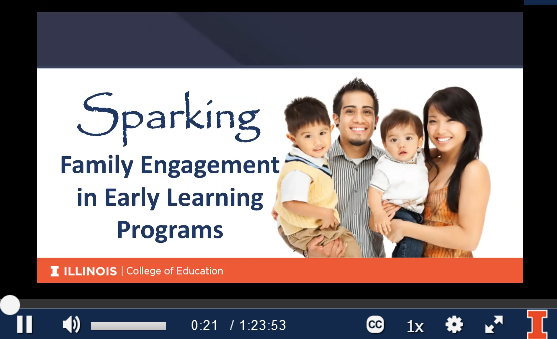Family Engagement is a key component to achieving success in most, if not all, early childhood projects. The Early Childhood Collective at UIUC has a wealth of valuable resources that can help you understand the importance of family engagement and promote participation of families in your community.
Illinois Early Intervention Clearinghouse
The Family’s Role in Early Intervention: How You Can Help Your Child
This family-friendly tip sheet provides brief, practical ways that parents and care givers can be involved in services and the importance of their role as advocates for their child. (Also available in Spanish)
Early Intervention: Partnership at Its Best
This short newsletter article describes the critical role that families play in early intervention services. (Also available in Spanish)
Additional Resources can be found at the following EIC Resource Guides: Family Engagement and Child Care and Family-Centered Practices
Illinois Early Intervention Training Program
Coaching Families of Young Children with Disabilities: What is it and How it Works – Part 1
This video is from a winter webinar created by EITP to provide professionals with knowledge and practical advice for coaching families.
Early Intervention Foundational Pillars: Family-centered practices
This training module created by Universal Online Part C EI Curriculum and offered through EITP describes the what family-centered means how important it is in engaging families.
Illinois Early Childhood Asset Map
Child and Family Characteristics
Knowing the demographics for a specific area can help community agencies better serve the needs of families. By meeting the needs of the families you can pave the way for greater family engagement. There is extensive collection of data available that can help you understand the families in your community.
Illinois Early Learning Project

Sparking Family Engagement in Early Learning Programs
Connecting with Parents: “But He Doesn’t Do That at Home!”
This family-friendly tip sheet provides brief, practical ways that childcare providers can connect with parents and acknowledge the differences in behavior children can exhibit between home and childcare. (Also available in Spanish and Polish)
Conference Time! Talking to Your Child’s Teacher or Caregiver
This family-friendly tip sheet describes ways a parent can be involved and prepared parent-teacher conferences. (Also available in Spanish and Polish and Korean)
OneOp (formerly Military Families Learning Network)
Engaging Families to Focus on Intervention Strategies
This webinar video was designed to help early interventionists, private therapy providers, and other professionals working with young children with disabilities think about their interactions with the child’s family and how those interactions strengthen a family’s ability to support their child’s learning.
Additional Links
Champaign’s Community Schools Initiative (video)
The Champaign Unit 4 School District success story is told by Katina Wilcher, MSW, the director of student, family, and community engagement. As of 2018, the school district has piloted the Community Schools Initiative in three elementary schools: Booker T. Washington, Garden Hills, and Stratton. According to the district website, “Community Schools bring a variety of services and resources to communities, including: health services, counseling, tutoring, after school programs, mentoring, and exposure to college and career opportunities.”
Colona Grade School (video)
Students and their families at Colona Grade School in Henry County benefit from the resources provided by the 21st Century Community Learning Center grant administered by the Regional Office of Education No. 28. Family engagement is a priority for the teachers, families, and the community partners in Colona. Ms. Brackett and Ms. Whipple describe how family engagement begins with a welcoming school atmosphere for every family, which creates a sense of community. Colona Grade School staff encourage families to share in their child’s education. Families may select a variety of opportunities (e.g., family activities, parenting workshops, school/community events) to be engaged with their student’s education.
East Aurora School District’s Parent Cafés (video)
A families and school engagement success story is under way in District 131, East Aurora, IL. The school district provides multiple ways for families and the community to engage in its schools. The staff have been following the Parent Café process. According to Be Strong Families, “Parent Cafés are based on the principles of adult learning and family support and are a gateway to providing parent leadership opportunities.” In this video, staff and parent interviews are interspersed with scenes from a recent Parent Café event that illustrates just one of many opportunities families have to engage in their student’s school in District 131.
Peoria District 150’s Parent University
The Peoria School District 150 “Parent University” program has been around for several years, but a new approach during the 2016–2017 academic year has led to a great increase in family participation.
Springfield District 186 APTT Program (video)
Building relationships and investment in children’s learning and achievement is essential for successful family engagement. Since 2017, Matheny-Withrow Elementary School in Springfield, Illinois has used the Academic Parent-Teacher Teams (APTT) model to increase its family engagement. The APTT model provides parents and teachers with a structure for sharing information about each child’s academic progress on grade-level content (e.g., reading fluency, math computation). The APTT model promotes scheduling designated times during the school year for parents and teachers to meet together, build relationships, and collaborate on academic activities that ensure student learning and achievement occur both inside and outside the school setting.
West Chicago Elementary School District 33 (video)
West Chicago Elementary School District 33 family engagement includes connecting families to the many district and community resources that are available. The schools reflect the cultural and linguistic diversity of West Chicago and portions of Winfield and Wheaton that are also in the district. Family and school communication is done through a variety of methods (e.g., social media, text messages, phone calls, newsletters). School district staff are part of WeGo Together for Kids, a coalition of more than 40 organizations dedicated to identifying resources and implementing programs to improve the lives of community residents.
